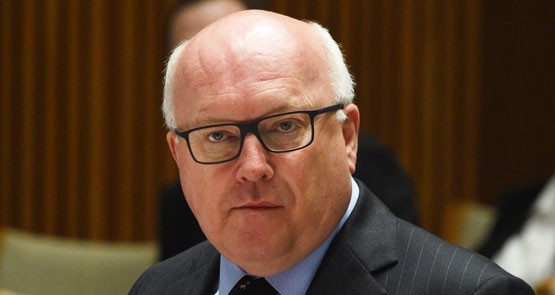
The Senate could put a stop to the government proceeding with plans to hold an expensive $160 million plebiscite on same-sex marriage, with the government needing crossbench support in order to get legislation ready before the election.
Attorney-General George Brandis is currently drafting legislation for the plebiscite question to be put to the Australian people after the next election. If successful, it has been reported that there would be specific exemptions expected to apply to religious organisations, celebrants and other public officials from conducting same-sex weddings or other duties if they object to same-sex marriage.
It is expected to go to the Coalition joint party room later this month.
Crikey understands that at the same time as the legislation is being drafted, Brandis is strongly lobbying some crossbench senators to support the legislation backing the public vote, with the expectation that the Greens and Labor — which both call for the matter to be settled by a free vote in Parliament — will vote against any plebiscite legislation.
But coming up with the votes for the legislation could be a struggle for Brandis. Following comments from the hard-right faction of the Liberal Party, Eric Abetz and Cory Bernardi, plus Nationals Senator Brigid McKenzie that they would vote against same-sex marriage regardless of the plebiscite’s outcome, the Australian Electoral Commission’s estimate that the plebiscite could cost up to $160 million is seeming an expensive ask.
More conservative crossbench senators such as Family First’s Bob Day and independent John Madigan are also unlikely to back same-sex marriage, so their vote for a plebiscite is not guaranteed.
Crikey understands that Motoring Enthusiast Party Senator Ricky Muir has not had any recent conversations with Brandis regarding the proposed legislation, but he told Crikey in a statement he would back same-sex marriage if a vote came up now, and said the plebiscite proposal was seeming more of a waste, day by day.
“With reports of some within the major parties stating that they would not support the view of the plebiscite if the result was in support of marriage equality, I would be fearful that it could be a significant waste of taxpayers’ money,” Muir said. “Ultimately, I would prefer a vote on marriage equality to happen sooner rather than later and for this significant social issue to be resolved, instead of being used for political mileage by certain parties every election cycle.”
A spokesperson for Brandis did not respond to a request for comment by deadline.
Last week, Prime Minister Malcolm Turnbull admitted that the plebiscite was not his favoured choice:
“It is certainly not the approach that I favoured at the outset. I am a traditionalist. This was a case of democratic innovation. The innovator was out innovating, so there you go. Every Australian will have a say.”
The Senate also last week debated whether the government should recognise same-sex marriages from jurisdictions outside Australia. Liberal Senator David Fawcett strongly opposed the proposal, stating it could mean that the government might also have to recognise child marriages from other nations.
Nationals Senator Matt Canavan, who spent most of this morning in estimates questioning why the Human Rights Commission supports same-sex marriage, argued that recognising same-sex marriage would make heterosexual marriage less special.
“If we do change this particular definition, it will remove some of the colour and imagination from our lives because we will no longer have a word that just describes the union between a man and a woman often coming together to make children. I think that is an incredibly miraculous and important event in many of our lives and in our culture, and we should have a particular institution and a particular word to describe the creation of the next generation.”








When Ricky Muir is the voice of reason, something has gone seriously wrong.*
* Props to sen. Muir, he’s turned out to be far more thoughtful than many of us expected.
Canaan doesn’t mean the F word, surely?
Did a Senator really say that? Surely coming together is not a pre requisite for conception. It all gets more like NewsThump every day!
While I admit that I’ve never previously heard of Senator Canavan, after reading a statement like that, I’d be willing to bet at short odds, that he’s having an extramarital affair. Not necessarily with a woman.
“we should have a particular institution and a particular word to describe the creation of the next generation”
I think it’s called “The F*ck”!